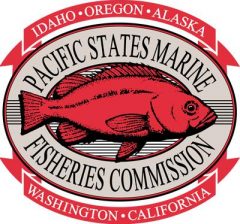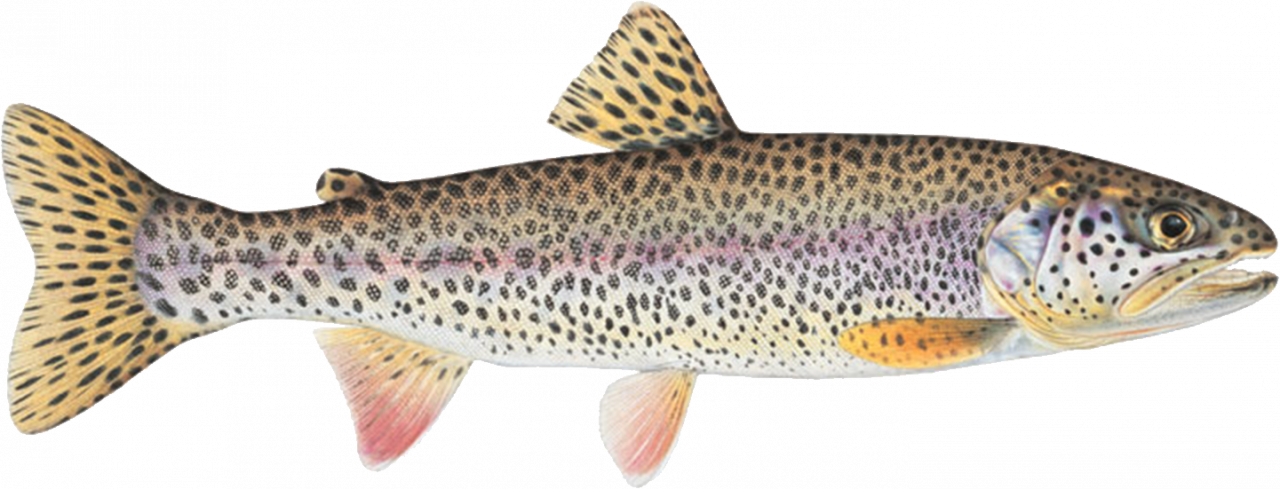Held November 7-8 2018, in Newport, Oregon
Goals:
- Advance the conservation and sustainable management of Coastal Cutthroat Trout by sharing information and knowledge gained since the 2005 Coastal Cutthroat Trout Symposium;
- Identify and enhance essential knowledge on trout life history and ecology;
- Provide the latest assessments of the status of populations coast-wide with emphasis on anadromous populations;
- Define and seek solutions to the problems associated with cutthroat trout management;
- Discuss the future of Coastal Cutthroat Trout and advance the development of a coordinated, range-wide conservation plan including data sharing.
Introduction: Past, Present, and Future of Coastal Cutthroat Trout –Kitty Griswold and Stephen Phillips, PSMFC
EVOLUTION AND TAXONOMY – Moderator: Kitty Griswold
Cutthroat Trout Evolutionary Biology and Taxonomy – Pat Trotter, Fishery Science Consultant
Geographic Variation, Isolation, and Evolution of Cutthroat Trout – Dennis Shiozawa & Paul Evans , BYU
Diversity of Coastal Cutthroat Trout across their Distributional Range – Tommy Williams, NMFS
STATUS,TRENDS AND MANAGEMENT:COASTAL CUTTHROAT TROUT STATUS UPDATES – Moderator: Roger Harding
California– Justin Garwood, CDFW
Oregon – Chris Lorion, ODFW
Washington – James Losee, WDFW
British Columbia – Ron Ptolemy, BC Government
Alaska –Roger Harding, ADF&G-Retired
STATUS, TRENDS, AND MANAGEMENT – Moderator: James Lossee
Status of Coastal Cutthroat Trout in the Continental US – Kitty Griswold, PSMFC
Geographic Variation, Isolation, and Evolution of Cutthroat Trout – Christopher Burns, LGL Limited
Environmental Predictors of Spawn Timing – Riley Freeman, WDFW
An urban stream can support a healthy population of Coastal Cutthroat Trout – Brook Silver, USFWS
Smith River Population Structure – Sam Rizza, Stillwater Sciences
BIOLOGY SESSION (Day one) – Moderator: Deborah Hart
Ocean distribution and ecology of Coastal Cutthroat Trout – William Pearcy, OSUC
Comparison of Age & Life-History Estimates in Puget Sound – Andrew Claiborne, WDFW
Life History Strategies & Movement Patterns – Gabe Madel, WDFW
BIOLOGY SESSION (Day two) – Moderator: Ron Ptolemy
Coastal Cutthroat Trout Response to Environmental Extremes – Brooke Penaluna, USFS
Status of CCT in the San Juan Archipelago – Jamie Glasgow, Wild Fish Conservancy, Washington
Using Angler Reported Catch to Determine the Prevalence of CCT Ectoparasite Infections – Derek Dapp, WDFW
Should I stay or should I go now? Seasonal migration in the Long Tom River – Karen Hans, ODFW
Influence of CCT on Food Web Topology & Community Stability in Headwater Streams– –Lauren Zatkos, OSU
BIOLOGY SESSION (Day two) Moderator: Lauren Zatkos, OSU
Population Dynamics of Coastal Cutthroat Trout in Old-Growth – Stan Gregory, OSU
Comparative Feeding Ecology of Coastal Cutthroat Trout and Rainbow Trout in the Cedar River – Roger Tabor, USFWS
Recovery of Fish Populations & Physical Channel Characteristics – Jason Walter, Weyerhaeuser
Willamette River Coastal Cutthroat Trout, Seasonal Movements – Hannah Barrett, OSU
CCT Responses to Gap Formation in the Riparian Forest Canopy – Dana Warren, OSU
BIOLOGY SESSION(Day two) Moderator: Brooke Penaluna
Multi-Scale Assessment of CCT Demographics in Headwater Streams of Western Oregon – Doug Bateman, USGS
Muted Response by Anadromous Salmonids – Ron Ptolemy, British Columbia
Long-Term Population Response of CCT to Environmental Fluctuations in a Temperate Rainforest Stream – Robert Vadas, WDFW
Density-Dependence vs Density Independence – Ivan Arismendi, OSU
The Challenges of Climate Change to Coastal Cutthroat Trout Across Their Distributional Range – Gordon Reeves, USFS
Thermal Tolerance of Coastal Cutthroat Trout – Kara Anlauf-Dunn, ODFW
FUTURE EFFORTS AND CONSERVATION SESSION – Moderator: Therese Thompson, WNTI
WNTI Perspectives on CCT Partnerships and Conservation – Therese Thompson, Western Native Trout Initiative
USFS Perspectives on CCT Conservation using Redband Trout as case study – James Capurso, USFS

